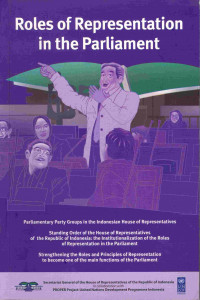
Text
Roles of Representation in the Parliament
In democratic parliaments, MPs are elected by the citizens. Some electoral systems upon which MPs are elected are based on geographic constituencies (either single MP or multiple MPs per constituency), while other systems may have formal or informal links to ethnic, religious or other sectoral constituencies through party lists. In either case, for an MP to be successful, the citizens must have some sense that they are being effectively represented in the parliament.
This proximity to citizens is the basis of parliaments’ representative function. According to John K. Johnson, writing for the World Bank Institute, “Unlike chief executives, who represent entire nations, or bureaucrats and judges, whose responsibility it is to carry out and interpret the law impartially toward all citizens, legislators are responsible for representing the differences in society, and for bringing these differences into the policy-making arena.” The parliament, as the sum total of these differences, is said to represent the beliefs and ideas of a nation.
The representative function of a parliament is characterised by its role as a venue for disparate perspectives, for the expression and debate of issues of local and national importance, and the translation of those debates into policies. For MPs, effective representation requires engaging their constituents in continuing dialogue in order to understand their views and perspectives, and to rely on their knowledge on various topics. MPs must then utilise the powers vested in their office (i.e. legislating, participating in debates, authoring questions, etc.) to voice the resulting ideas. Through the parliamentary committees an MP can use the formal structure of parliament to engage constitiuents and provide them with direct access to the decision-making process within the institution.
MPs must maintain ongoing constituency relations to demonstrate their accomplishments and to seek the input of citizens. Aside from reengaging constituents in dialogue, MPs may also provide other types of constituency services, including casework (i.e. helping to solve constituents’ problems), facilitation of access to the executive branch and advocating for resources for the constituency. In a growing number of countries, MPs are provided with Constituency Development Funds to allocate limited but significant funding to capital projects that are a priority for the MP and the constituency.
Availability
| KP XXI.000219 | KP XXI FEU r | My Library | Available |
Detail Information
- Series Title
-
-
- Call Number
-
KP XXI FEU r
- Publisher
- Jakarta : Secretariat- eneral of The House of Representatives of RI., 2011
- Collation
-
viii, 282p. ; 22cm.
- Language
-
Indonesia
- ISBN/ISSN
-
-
- Classification
-
KP XXI
- Content Type
-
-
- Media Type
-
-
- Carrier Type
-
-
- Edition
-
2008
- Subject(s)
- Specific Detail Info
-
-
- Statement of Responsibility
-
-
Other version/related
No other version available
File Attachment
Comments
You must be logged in to post a comment
 Computer Science, Information & General Works
Computer Science, Information & General Works  Philosophy & Psychology
Philosophy & Psychology  Religion
Religion  Social Sciences
Social Sciences  Language
Language  Pure Science
Pure Science  Applied Sciences
Applied Sciences  Art & Recreation
Art & Recreation  Literature
Literature  History & Geography
History & Geography